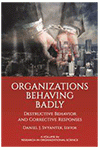
Organizations Behaving Badly
Destructive Behavior and Corrective Responses
Edited by:
Daniel J. Svyantek, Auburn University
A volume in the series: Research in Organizational Science. Editor(s): Daniel J. Svyantek, Auburn University.
Published 2021
Organizational science profits from taking new perspectives using a simple model to understand why behaviors of particular types occur within them. This volume provides readers with a rich source of casestudies and empirical studies of the role played by the interaction between individual actors, organizational contexts, and the actual behaviors being performed the actors. These chapters each seek to describe how these three interact in to create organizational practices with negative effects on either internal members of the organization or external stakeholders (e.g,. clients). The chapters provide insight into how organizations may control these negative behaviors with basic Human Resource Management practices. It is this volume’s hope that these chapters may provide insight into the important role these three factors plays in understanding negative organizational behavior within organizations across the world.
CONTENTS
Introduction—Organizations Behaving Badly: Using Destructive Organization Behaviors to Inform Corrective Management Practices, Daniel J. Svyantek. Formation and Maintenance of Corporate Culture via Socialization, Alexa Doerr. We Build Then We Break: The Impact of Military Sexual Trauma on Organizational Commitment in the United States Military, Stephanie E. V. Brown and Samantha C. January. “Pour Encourager les Autres”: Punishment as a Signal of Organizational Decision Frames, Daniel J. Svyantek. Armed, Not Ready: Technological Determinism, Discourse, and the Blitzkrieg of Today, Rachel L. Whitman. Cognitions Associated With Organizational Deviant Behaviors, Thomas Wilmore. When Bullies Get Jobs: Workplace Bullying in Local Governments, Regan E. Gaskin and Erin L. Borry. Predicting Ethical Behavior: A Person-Situation Approach Elizabeth Ritterbush, Adam Smith, Rachel Whitman, and Daniel J. Svyantek. Trait Emotional Intelligence Differences in Precareer and Midcareer United States Military Leaders, Andrew L. Bond and Daniel J. Svyantek. About the Authors.
-
Paperback978-1-64802-354-5
Web price: $45.04 (Reg. 52.99)
-
Hardcover978-1-64802-355-2
Web price: $80.74 (Reg. 94.99)
- eBook978-1-64802-356-9

- BUS041000 - BUSINESS & ECONOMICS: Management
- BUS042000 - BUSINESS & ECONOMICS: Management Science
- BUS085000 - BUSINESS & ECONOMICS: Organizational Behavior
-
 A Closer Examination of Applicant Faking Behavior
A Closer Examination of Applicant Faking Behavior
-
 Crisis, Chaos and Organizations
The Coronavirus and Lessons for Organizational Theory
Crisis, Chaos and Organizations
The Coronavirus and Lessons for Organizational Theory
-
 Emerging Themes in International Management of Human Resources
Emerging Themes in International Management of Human Resources
-
 Organizational Processes and Received Wisdom
Organizational Processes and Received Wisdom
-
 Received Wisdom, Kernels of Truth, and Boundary
Conditions in Organizational Studies
Received Wisdom, Kernels of Truth, and Boundary
Conditions in Organizational Studies
-
 Refining Familiar Constructs
Alternative Views in OB, HR, and I/O
Refining Familiar Constructs
Alternative Views in OB, HR, and I/O
-
 Sports and Understanding Organizations
Sports and Understanding Organizations

